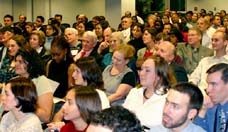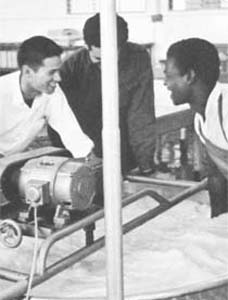March 6, 2005: Headlines: Staff: Journalism: Presidents - Johnson: Civil Rights: Richmond Times Dispatch: The night the Voting Rights Act of 1965 passed, White House press secretary Bill Moyers went to see Johnson, expecting to find him elated by his legislative and personal triumph, David Halberstam wrote in his book "The Children." Instead, Moyers found Johnson very depressed. Why? "I think we've just handed the South over to the Republican Party for the rest of our lives," Johnson said.
Peace Corps Online:
Directory:
USA:
Special Report: Peace Corps Deputy Director Bill Moyers:
February 9, 2005: Index: PCOL Exclusive: Staffer Bill Moyers :
March 6, 2005: Headlines: Staff: Journalism: Presidents - Johnson: Civil Rights: Richmond Times Dispatch: The night the Voting Rights Act of 1965 passed, White House press secretary Bill Moyers went to see Johnson, expecting to find him elated by his legislative and personal triumph, David Halberstam wrote in his book "The Children." Instead, Moyers found Johnson very depressed. Why? "I think we've just handed the South over to the Republican Party for the rest of our lives," Johnson said.
The night the Voting Rights Act of 1965 passed, White House press secretary Bill Moyers went to see Johnson, expecting to find him elated by his legislative and personal triumph, David Halberstam wrote in his book "The Children." Instead, Moyers found Johnson very depressed. Why? "I think we've just handed the South over to the Republican Party for the rest of our lives," Johnson said.
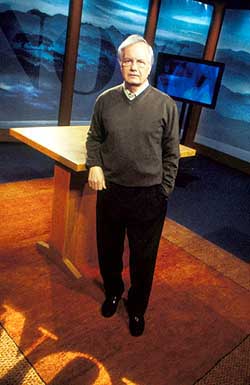
The night the Voting Rights Act of 1965 passed, White House press secretary Bill Moyers went to see Johnson, expecting to find him elated by his legislative and personal triumph, David Halberstam wrote in his book "The Children." Instead, Moyers found Johnson very depressed. Why? "I think we've just handed the South over to the Republican Party for the rest of our lives," Johnson said.
Freedom here was the issue 40 years ago
MARSHA MERCER
POINT OF VIEW
Mar 6, 2005
WASHINGTON If you haven't caught the retrospectives of "Bloody Sunday," the 1965 civil-rights march in Selma, Ala., it's not too late.
Newspapers, TV stations and Web sites are focusing this week on the 40th anniversary of the march.
Many Americans weren't alive when the march took place, and time has a way of dimming the recollections. The stories, pictures and oral histories tell a compelling story about American values.
In 2005, President Bush speaks movingly about the need to spread freedom and liberty around the globe. Forty years ago, though, President Lyndon B. Johnson summoned the nation to a cause close to home: the freedom of all Americans.
"There is no Negro problem. There is no Southern problem. There is no Northern problem. There is only an American problem," Johnson said March 15, 1965, in a televised speech to Congress.
The American problem was that in many places, men and women were kept from voting because of the color of their skin.
When Johnson spoke, shocking images of violence in the South were fresh in everyone's mind. Eight days earlier, a demonstration in Selma had turned bloody when state troopers and other law-enforcement officials brutalized peaceful demonstrators whose only "crime" was asking for the right to vote.
The confrontation seared the nation's conscience and pushed the president to act.
In his televised address, considered among the best political speeches ever, Johnson took on the thorniest issue in America -- racial inequality. He asserted that the promise of the Emancipation Proclamation remained unfulfilled.
"A century has passed, more than a hundred years, since equality was promised. And yet the Negro is not equal," he said.
To remedy that, Johnson urged Congress to move quickly to strike provisions in all elections -- federal, state and local -- that were being used to deny blacks the right to vote. And he called on all people to join the fight.
"There is really no part of America where the promise of equality has been fully kept," he said. "In Buffalo as well as in Birmingham, in Philadelphia as well as in Selma, Americans are struggling for the fruits of freedom.
"This is one nation. What happens in Selma or Cincinnati is a matter of legitimate concern to every American."
Less than five months later, an energized Congress passed the Voting Rights Act of 1965.
The night the bill passed, White House press secretary Bill Moyers went to see Johnson, expecting to find him elated by his legislative and personal triumph, David Halberstam wrote in his book "The Children."
Instead, Moyers found Johnson very depressed. Why?
"I think we've just handed the South over to the Republican Party for the rest of our lives," Johnson said.
The prescient remark speaks not only to Johnson's understanding of his home region but of the magnitude of the societal changes his legislation would bring.
Johnson also knew that merely passing laws wouldn't solve the problem. He signed the Voting Rights Act into law Aug. 6. Five days later, riots erupted in the Watts section of Los Angeles. They spread to a 140-block area and claimed 35 lives.
By any measure, life has improved greatly for blacks and whites in the past four decades. Blacks hold high positions in business and government, and about 9,000 blacks nationwide hold elective office. Savvy Southerners such as Bill Clinton and Jimmy Carter have built coalitions with blacks to win the presidency. Republicans court black voters, and Democrats take blacks for granted at their peril.
Now, though, Republicans and Democrats also woo Hispanics. The demographics have shifted. Hispanics, not blacks, are the nation's largest minority community, according to the Census Bureau. Hispanics have not yet gained the political clout their numbers would indicate because many are not yet citizens and don't vote. That's likely to change.
The Voting Rights Act now protects Hispanics as well as blacks from voting discrimination. When the law comes up for renewal in 2007, supporters will cite rising numbers of Hispanics as one reason to extend it.
Johnson couldn't have foreseen that change, but he did warn it was futile to cling to the past.
"I say to all of you here, and to all in the nation tonight, that those who appeal to you to hold on to the past do so at the cost of denying you your future."
Marsha Mercer is Washington bureau chief of Media General News Service. E-mail mmercer@mediageneral.com
When this story was posted in March 2005, this was on the front page of PCOL:
 | The Peace Corps Library
Peace Corps Online is proud to announce that the Peace Corps Library is now available online. With over 30,000 index entries in over 500 categories, this is the largest collection of Peace Corps related reference material in the world. From Acting to Zucchini, you can use the Main Index to find hundreds of stories about RPCVs who have your same interests, who served in your Country of Service, or who serve in your state. |
 | RPCVs in Congress ask colleagues to support PC
RPCVs Sam Farr, Chris Shays, Thomas Petri, James Walsh, and Mike Honda have asked their colleagues in Congress to add their names to a letter they have written to the House Foreign Operations Subcommittee, asking for full funding of $345 M for the Peace Corps in 2006. As a follow-on to Peace Corps week, please read the letter and call your Representative in Congress and ask him or her to add their name to the letter. |
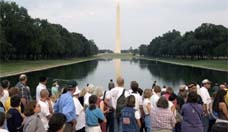 | March 1: National Day of Action
Tuesday, March 1, is the NPCA's National Day of Action. Please call your Senators and ask them to support the President's proposed $27 Million budget increase for the Peace Corps for FY2006 and ask them to oppose the elimination of Perkins loans that benefit Peace Corps volunteers from low-income backgrounds. Follow this link for step-by-step information on how to make your calls. Then take our poll and leave feedback on how the calls went. |
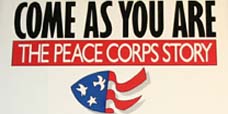 | Coates Redmon, Peace Corps Chronicler
Coates Redmon, a staffer in Sargent Shriver's Peace Corps, died February 22 in Washington, DC. Her book "Come as You Are" is considered to be one of the finest (and most entertaining) recountings of the birth of the Peace Corps and how it was literally thrown together in a matter of weeks. If you want to know what it felt like to be young and idealistic in the 1960's, get an out-of-print copy. We honor her memory. |
 | Make a call for the Peace Corps
PCOL is a strong supporter of the NPCA's National Day of Action and encourages every RPCV to spend ten minutes on Tuesday, March 1 making a call to your Representatives and ask them to support President Bush's budget proposal of $345 Million to expand the Peace Corps. Take our Poll: Click here to take our poll. We'll send out a reminder and have more details early next week. |
 | Peace Corps Calendar: Tempest in a Teapot?
Bulgarian writer Ognyan Georgiev has written a story which has made the front page of the newspaper "Telegraf" criticizing the photo selection for his country in the 2005 "Peace Corps Calendar" published by RPCVs of Madison, Wisconsin. RPCV Betsy Sergeant Snow, who submitted the photograph for the calendar, has published her reply. Read the stories and leave your comments. |
 | WWII participants became RPCVs
Read about two RPCVs who participated in World War II in very different ways long before there was a Peace Corps. Retired Rear Adm. Francis J. Thomas (RPCV Fiji), a decorated hero of the Japanese attack on Pearl Harbor, died Friday, Jan. 21, 2005 at 100. Mary Smeltzer (RPCV Botswana), 89, followed her Japanese students into WWII internment camps. We honor both RPCVs for their service. |
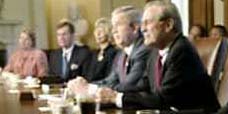 | Bush's FY06 Budget for the Peace Corps
The White House is proposing $345 Million for the Peace Corps for FY06 - a $27.7 Million (8.7%) increase that would allow at least two new posts and maintain the existing number of volunteers at approximately 7,700. Bush's 2002 proposal to double the Peace Corps to 14,000 volunteers appears to have been forgotten. The proposed budget still needs to be approved by Congress. |
Read the stories and leave your comments.

Some postings on Peace Corps Online are provided to the individual members of this group without permission of the copyright owner for the non-profit purposes of criticism, comment, education, scholarship, and research under the "Fair Use" provisions of U.S. Government copyright laws and they may not be distributed further without permission of the copyright owner. Peace Corps Online does not vouch for the accuracy of the content of the postings, which is the sole responsibility of the copyright holder.
Story Source: Richmond Times Dispatch
This story has been posted in the following forums: : Headlines; Staff; Journalism; Presidents - Johnson; Civil Rights
PCOL17663
82
.








